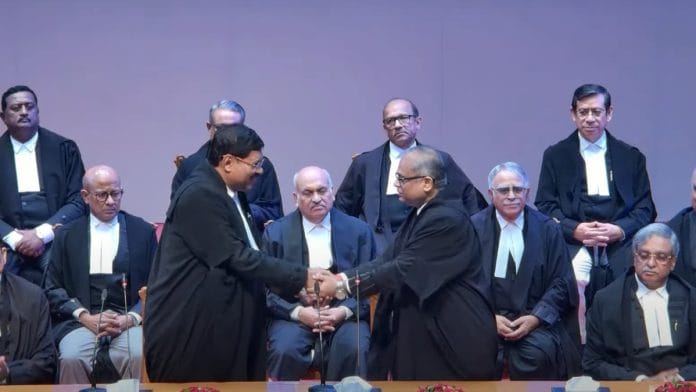New Delhi: Amidst a controversy over his recommendation, Justice Vipul Manubhai Pancholi took oath as a Supreme Court judge on 29 August. This came just two days after the Centre cleared his elevation to the top court, along with that of Justice Alok Aradhe.
Justice Pancholi’s elevation was cleared by a 4:1 majority, with the lone woman judge of the Supreme Court (also a Collegium member), Justice B.V. Nagarathna, submitting a dissent note. In it, she warned that the judge’s elevation could prove “counter-productive” to the administration of justice and damage the credibility of the Collegium system.
After taking the oath on 29 August, Justice Pancholi now becomes the third sitting Supreme Court judge from the Gujarat High Court, after Justices J.B. Pardiwala and N.V. Anjaria.
He is also in line to become the 60th Chief Justice of India, expected to serve for nearly 18 months between October 2031 and May 2033.
Also Read: Supreme Court Collegium recommended 136 names for HC judgeship in last 17 months. Only 20 are women
Who is Justice Pancholi
Justice V.M. Pancholi, 57, was born in Ahmedabad and began his legal career after enrolling with the Bar in September 1991. Practising primarily before the Gujarat High Court, he served as Assistant Government Pleader and Additional Public Prosecutor for close to seven years until March 2006.
He was elevated as an Additional Judge of the Gujarat High Court in October 2014, and confirmed as a permanent judge two years later in 2016.
Justice Pancholi’s career took a turn in September 2022 when the Supreme Court Collegium recommended his transfer to the Patna High Court.
The decision triggered strong opposition from the Gujarat High Court Advocates’ Association (GHCAA), which called him a “fine judge” and even launched an indefinite strike. GHCAA wrote to then CJI D.Y. Chandrachud, urging reconsideration and warning that Gujarat would lose a jurist with nearly eight productive years left.
Despite these protests, he was formally transferred in July 2023. Two years later, in July 2025, he was appointed Chief Justice of the Patna High Court, consolidating his administrative experience.
Notable judgments in Gujarat HC
In January 2022, Justice Pancholi dismissed a petition by TV18 Broadcast Limited and CNBC-TV18 journalists Latha Venkatesh and Nimish Shah seeking to quash a criminal defamation case filed by Adani Transmission Ltd (ATL). The case arose from news reports that, according to ATL, suggested links between certain foreign portfolio investors (FPIs) and the Adani Group in relation to rising share prices. By rejecting the plea, he allowed criminal proceedings before a Gandhinagar magistrate to continue.
He also presided over the politically sensitive defamation case against Congress leader Rahul Gandhi, arising from his 2019 “why do all thieves share the Modi surname” remark. In March 2022, Justice Pancholi granted interim relief by staying the trial, effectively pausing it. But in February 2023, noting sufficient evidence before the trial court, he vacated the stay, clearing the way for proceedings to continue.
In March 2022, he allowed the termination of a six-week pregnancy of a 17-year-old rape survivor, observing that pregnancy caused by rape may inflict lifelong trauma and forcing continuation would cause grave injury to her mental health.
In 2023, he ruled in favour of Sky Industries, which had been denied relief under the Vera Samadhan Yojna, 2019, due to a shortfall of just Rs 2,000. He held that such minor lapses should not defeat the purpose of an amnesty scheme.
Bail jurisprudence in Patna HC
In 2025, Justice Pancholi’s approach to bail and suspension of sentence reflected strict adherence to procedural boundaries and Supreme Court standards. In Md. Mursheed v. State of Bihar (May 2025), he denied bail under the NIA Act, noting that the trial was “nearing conclusion” and no change in circumstances justified release despite long custody.
Similarly, in Suchit Bind v. State of Bihar (March 2025), applying Supreme Court precedent, he refused bail in a murder case, finding no realistic chance of acquittal.
His ruling in Chandeshwar Das v. State of Bihar (July 2025) emphasised that appellate courts cannot reappraise evidence at the stage of sentence suspension under Section 389 CrPC.
At the same time, he displayed readiness to correct wrongful convictions: In Surendra Kumar v. State of Bihar (February 2025), he overturned life sentences for want of proof beyond reasonable doubt, and in State of Bihar v. S.K. Manso (June 2025), he dismissed a decades-old state appeal, upholding a 1987 acquittal.
Support and criticism
Justice Pancholi’s elevation has been marked by both firm support and sharp criticism. While Justice Nagarathna, several senior women advocates, and judicial reform groups questioned the transparency of his appointment, the Gujarat Bar’s vocal backing underscored the respect he commands in his parent high court.
Senior Advocate Asim Pandya, recalling that both he and Justice Pancholi worked under Sudhir Nanavati and taught law together, described him as “relief-oriented, humble, straightforward, considerate, mature”. Pandya dismissed speculation of a “punitive transfer” to Patna, adding, “There was no issue about his integrity and he would straightforwardly follow the law and work strictly within the constitutional framework.”
Yatin Oza, the youngest designated senior advocate at Gujarat HC, told ThePrint about the message he sent to Senior Advocate Indira Jaisingh on her opposing stance on Justice Pancholi’s elevation to the Supreme Court. Oza maintained that material put before the Collegium in 2022 (during Justice Pancholi’s transfer) was a result of internal conflicts.
(Edited by Viny Mishra)
Also Read: As SC Collegium considers proposal to tackle nepotism, how the bar views the possible move







You might be known the notorious Anti Hindu Anti national Christian justice Sudarshanreddy the Italian christan Muslim candidate for VP post? anything wrong for convicting the biggest Anti Hindu Anti national corrupt enimys agent Italian Christian Muslim bar girl son Raghul feroz khan for defomation case? should have been aquited because his back ground?